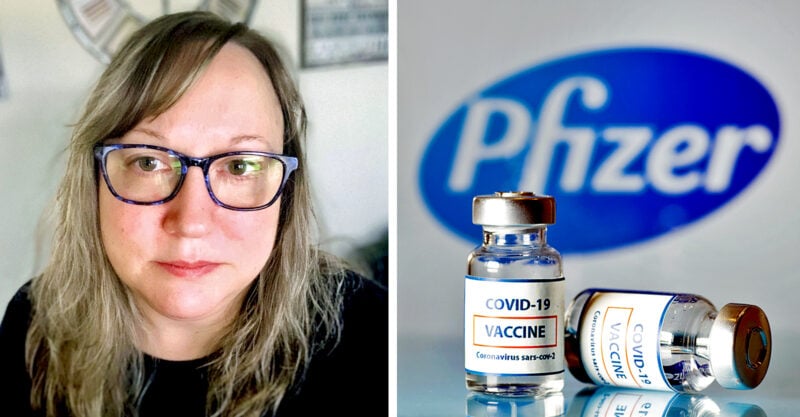Forced to Get Vaccine Despite Pre-Existing Heart Issue
Heather Elkins, 45, couldn’t get a medical exemption from her employer’s COVID-19 vaccine mandate despite a pre-existing heart condition — now she can’t work at all.
Miss a day, miss a lot. Subscribe to The Defender's Top News of the Day. It's free.
When her employer in 2021 mandated all employees get the COVID-19 vaccine, Heather Elkins, who had a pre-existing heart condition, requested a medical exemption.
But the Oregon Department of Human Services turned down her application — even though Elkins had transitioned, in 2020, to a permanent work-from-home employee.
Elkins told The Defender:
“All State of Oregon employees were mandated by Gov. Kate Brown to be fully vaccinated from COVID-19 or to meet a qualifying exemption regardless of if the employee was working from home or not and if we did not comply, we would lose our job!”
Elkins, 45, was reluctant to get the vaccine for several reasons, she said:
“I am by no means against vaccines. With that being said, I was not comfortable with the COVID-19 vaccine for a number of reasons. First, I didn’t feel like there was enough known about it and the long-term effects it might have.
“Second, I saw reports stating people were developing heart issues, and given that I myself have a heart issue, I wasn’t feeling comfortable with getting the vaccine.”
She added: “It’s my body and the decision should be my choice! I know how my body reacts to trauma, illness, etc. I should be able to choose what goes in it.”
Elkins tried every available avenue in her attempt to get an exemption. She told The Defender:
“I spoke to management, HR and my union, [Service Employees International Union] SEIU, multiple times about how uneasy I felt getting the COVID-19 vaccine. I also spoke with my doctors … multiple times about my concerns and asked for a medical exemption. They kept advising me to get the vaccine and stated the ‘reward outweighs the risk.’
“I even contacted my cardiologist … and was transferred to my cardiologist’s nurse, who stated: ‘we are not advising on whether or not you should receive the COVID-19 vaccine.’”
Elkins said given the vaccines were causing heart issues, she thought her cardiologist, of all people, would be willing to weigh in.
“That wasn’t the case here, she said. “They turned a blind eye.”
After she ran out of options — including not meeting the requirements for a religious exemption, either — Elkins was forced to choose between the vaccine and her job.
Symptoms occurred ‘within an hour’ of first Pfizer shot
Elkins got the Pfizer vaccine on Sept. 12, 2021, and “within about an hour,” she said, began experiencing adverse reactions.
The reactions she experienced after the first shot didn’t qualify her for a medical exemption from the second shot, she said:
“I even asked for a medical exemption from the second dose of the vaccine after several visits to the doctor for severe symptoms after receiving the first dose of Pfizer.
“I was told that they were not giving medical exemptions because the ‘reward outweighs the risk.’”
So despite continued efforts to secure a medical exemption, Elkins received her second Pfizer shot on Oct. 3, 2021, and experienced “the same severe reaction as with the first dose.”
The symptoms included “severe headache[s], severe muscle aches, [a] racing heartbeat … nausea, severe fatigue and dizziness/balance issues, chest pressure/tightness, shortness of breath [and] a severe cough,” she said.
A year later, Elkins continues to experience symptoms that affect her ability to work.
Elkins told The Defender:
“To date, I’m experiencing all the same issues in addition to other symptoms like brain fog, horrible joint pain, pins and needles sensations, painful nerve zaps, shakiness and tremors in my hands and feet, and vision issues.
“At times, some of the symptoms are worse than others, but the symptoms as a whole have been so debilitating daily, I eventually couldn’t continue working and have had to go on workman’s compensation for now.”
Prior to getting the vaccines, Elkins said she was “living a normal life, walking and jogging several times a week for exercise and living a normal life.”
But now, she said, “I’ve now been mostly confined to my bed for the last 11 months, unable to do minimal activities because of my debilitating symptoms,” she said. “Tasks that seemed easy before, like working on crafts, doing the dishes, cooking or a trip to the store is physically exhausting and my symptoms are overwhelming.”
After visiting a succession of doctors — including her primary physician, a COVID-19 recovery specialist, a physical therapist, a speech therapist, a cardiologist, a pulmonologist, a rheumatologist, a neurologist and an ophthalmologist — Elkins was diagnosed with dysautonomia, a condition characterized by a malfunctioning autonomic nervous system, she said.
“Most of the doctors I’ve seen think I’m having some kind of immune response to the vaccine but don’t know why or how to stop it because so little is known.”
She’s tried a variety of medications and treatments, including physical therapy, speech therapy, a clean diet and even celery juice, but “none of them seem to be helping,” Elkins said.
“The pulmonologist has me on a steroid inhaler which helps so long as I’m not having long conversations or exerting myself.
She added:
“I have no personal life because every time I try to leave home and do anything social, my symptoms are exacerbated. I spend most of my days in bed. And on good days, I make it out to the living room to rest in a recliner.”
Although she was unable to secure a medical exemption for her first or second doses, Elkins said that she has “now been told I can have an exemption from the booster” — but only after “multiple visits with multiple doctors,” who told her that the reaction she experienced “is severe.”
Elkins said her primary doctor “has since apologized to me verbally for not listening to my concerns when I asked for the medical exemption.”
Though too late to help Elkins, her employer subsequently removed the mandate, “at the same time they were doing a big hiring push for new employees,” she said.
Government ‘sweeping it under the rug, like it isn’t real’
Though friends and family have provided some support, they don’t fully understand what she’s experiencing, Elkins said.
“Either they are supportive quiet, or just try to explain away the reason for my symptoms such as… ‘maybe the vaccine exacerbated a condition you already had that you didn’t know about or that was dormant.’”
Elkins, who said she knows “with 100% certainty that I was healthy prior to the COVID-19 vaccine,” has found a greater level of support through online support groups for vaccine-injured groups — including the Vaccine Injury/Side Effects Support Group, Real Not Rare and ReAct19.
“They’ve all been a wealth of information,” she said.
Even though “it’s sad to hear the stories being shared,” Elkins said, “it’s comforting to know that others understand and know what it’s like to go through what you are [going through]. These side effects are debilitating and it is very easy to become depressed, even if you’re someone like me who has never really experienced that in the past.”
She said the people in these support groups are “vital” to healing. “Not only are we able to relate to one another, but these ‘perfect strangers’ understand in ways your closest family members and friends can’t.”
Elkins hopes these groups — and the vaccine-injured individuals who are speaking out — will translate to pressure on governmental authorities.
“Our government needs to take accountability for the lack of transparency with the COVID-19 vaccines,” said Elkins. “Their lack of transparency and shadiness surrounding adverse reactions is hurting so many, but they just continue sweeping it under the rug like it isn’t real or happening.”

